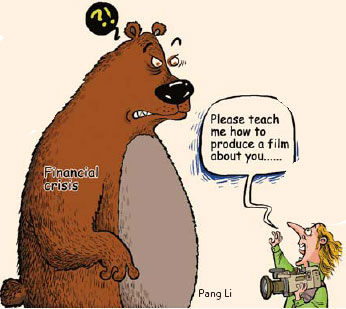No talent to describe crisis
Well, you know the bad news, and we are all left to wonder at how the last serious depression went on the worst part of 10 years and was only finally dispelled by a war. Then there is the good news. The last time there was such a depression, the place once known as Hollywood produced I Am a Fugitive from a Chain Gang, Footlight Parade, My Man Godfrey, Man's Castle, Mr Deeds Goes to Town, The Grapes of Wrath, Dead End, Our Daily Bread and City Lights.
There's no need to argue whether all of those films are great, but they all confront the fact that millions of people in the 1930s were facing the hardships of poverty, which can easily extend to death, disaster and degradation. This seems an oddity, for nearly all these films were the product of a factory system eager to regard happiness and wellbeing as ultimate American ideals.

But the men and women who kept the factory working - especially the writers - were ex-journalists who would not cheat on the real facts of the nation, as well as novelists and playwrights who felt a range of feelings from anger to compassion. So enough of the factory films came out sardonic, ironic, rueful, tortured and just plain angry.
My Man Godfrey is a comedy in which Carole Lombard, playing a giddy socialite, goes looking for a "forgotten man" at the city dump - a man fallen from grace, a hobo, a bum. I know, the guy she finds proves to be William Powell, the perfect gentleman, and it all turns out well. But My Man Godfrey does not mask the realities on which it is based. There is a candor in some films of the 1930s, a pungent wit, and a sense of necessary reform that led to some of those writers being charged as reds later on.
How will it be this time? The US motion picture business has been worried for years. It knew the audience was shrinking, and sensed its own inability to reproduce the populism of the 1930s and 1940s. And nobody yet knows the extent of this crisis. So there's no point in anyone - let alone Hollywood - asking if it has the writers and directors who might speak to the nation while offering merciful consolation and some distant hope.
You only have to look at the films the US mainstream has made in this century so far to know that we lack the talent or experience that will count. In 1930, the talent in American pictures was from literature, the theater and journalism, with educated backgrounds and a shared sense of the moral identity in being American.
Today's talent consists of absurdly rich young people who have made the hits of the past dozen years. They know very little about life, except what they have to lose.
Those people and much of the audience have lost the habit, or even the memory, of hard times. And the connection between that dismay and great hopes has had 1960 years of prosperity, supremacy and self-satisfaction.
The last is the most alarming trait, for it indicates the loss of a critical spirit and a sense of politics that believes in the steady decay of power. The critical spirit that made My Man Godfrey and wrote The Grapes of Wrath is not coming back at a snap of the fingers.
Americans (and the people of many other nations) need to reacquire a capacity for experience, for registering what happens to you and seeing it writ large in the people as a whole.
The Guardian
(China Daily 10/23/2008 page10)








